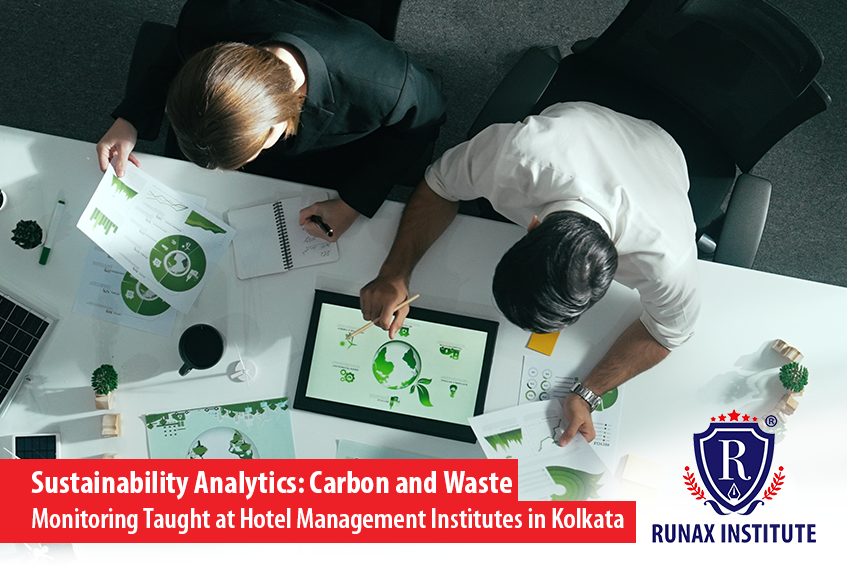Introduction
Let’s be real – running a hotel without considering sustainability today is like trying to make tea without water. Comfortable mattresses and sumptuous buffets are no longer the only aspects of hospitality. It’s about smart, eco-conscious operations that help the planet while serving guests. That’s where hotel management institutes in Kolkata step up, transforming how future hoteliers think and act. Students now learn more than customer service; they’re mastering sustainability analytics in Hospitality, a must-have for the modern industry.
Leading hotel management institutes in Kolkata offer courses that integrate carbon footprint hotel education and waste audits for hotel management directly into their core curriculum. Why? Because hospitality’s gone green – and not just in colour palettes. Global hotels are under increasing pressure to meet ESG hospitality targets, report sustainability KPIs for hotels, and adopt circular hospitality models that minimise waste and maximise resource efficiency.
By incorporating IoT energy monitoring, hotel technologies and smart meter hospitality labs, students don’t just study sustainability from textbooks. They live it – measuring energy use, tracking waste, and using water usage hotel dashboards to optimise operations. This practical, hands-on approach ensures graduates can lead environmentally responsible operations in Kolkata’s growing eco-hotel scene, along with smart building management.
In this comprehensive guide, we’ll unpack exactly how hotel management courses in Kolkata are embedding sustainability analytics into their DNA, making future hotel professionals tech-savvy, eco-conscious, and industry-ready.
Basics of the Carbon Footprint: Teaching Scope 1, 2, and 3 Metrics
Now, let’s talk carbon. Every hotel emits greenhouse gases, from kitchen burners to outsourced laundry. In Kolkata’s hotel management classrooms, students are getting fluent in tracking these emissions using Hotel GHG Protocol training. They are learning how to quantify three different kinds of emissions:
- Scope 1: Direct emissions from on-site fuel use – think diesel generators or kitchen gas stoves.
- Scope 2: Indirect emissions from purchased electricity to power those chandeliers and air conditioners.
- Scope 3: Emissions beyond the hotel walls – like supplier deliveries or business travel.
Students conduct workshops measuring fuel consumption in kitchens, electricity use in housekeeping, and emissions linked to procurement. This is real-world data, not theory. They compile accurate carbon footprint inventories following global standards like the GHG Protocol.
Why does this matter? Because tomorrow’s hotel managers must justify every watt and every gram of CO2 they emit. Understanding Scope 1, 2, and 3 isn’t just academic – it’s essential to running eco-smart hotels and meeting compliance standards.
IoT & Smart Meters: Real-Time Energy and Water Analytics
Introducing smart meter hospitality labs and IoT energy-monitoring hotel systems, the digital foundation of contemporary sustainable hotels. Gone are the days of guessing energy usage. Today’s students in hotel management institutes in Kolkata are trained to monitor resource consumption in real-time using advanced sensors and dashboards.
These courses teach:
- Installing IoT sensors across hotel facilities – tracking energy, water, and HVAC systems.
- Using platforms like Analytika to visualise real-time consumption and spot anomalies.
- Managing water usage with hotel dashboards for tracking per-guest water consumption.
Students learn to diagnose inefficiencies quickly. For instance, if water usage spikes suddenly, they can detect a leak or overuse in seconds. This proactive maintenance slashes wastage and boosts operational efficiency.
This isn’t just fancy tech – it’s training the next-gen eco-managers who’ll lead Kolkata’s hotels towards carbon neutrality and operational excellence.
Waste Stream Tracking: Composting, Recycling & Food Analytics
Waste management? It’s not glamorous, but it’s crucial. From buffet leftovers to disposable amenities, waste streams in hotels are massive. In Kolkata’s hospitality courses, students undergo a rigorous waste audit for hotel management modules.
They’re trained to:
- Audit waste sources – from kitchens, guest rooms, and events.
- Quantify organic, recyclable, and landfill waste using digital tools.
- Apply waste diversion strategies – composting organic waste, reusing linen, and improving recycling rates.
- Analyse food waste using food waste analytics courses, identifying overproduction and spoilage hotspots.
By visualising waste data, students assess cost and carbon savings – aligning with global programmes like Accor’s Planet 21. They’re not just reducing waste – they’re transforming waste streams into data-driven sustainability solutions.
Curriculum Integration: Sustainability Projects and Role-Play
No boring lectures here. Students participate in immersive eco-resort role-play training and group projects that challenge them to design sustainable hotel operations from scratch.
Picture students virtually retrofitting a Kolkata hotel with:
- Solar panels
- Greywater recycling systems
- Sensor-controlled lighting
- Guest-driven sustainability programs
Using VR and data simulation, students predict how each intervention affects resource usage, costs, and guest satisfaction. These projects push them to balance business goals with environmental responsibility, embedding sustainable thinking into their managerial mindset.
These experiential learning methods ensure students graduate ready to implement real-world sustainability strategies, not just talk about them.
Performance Monitoring: KPIs and Reporting Dashboards
Managing without measuring? Impossible. Students learn to build sustainability reporting in hotel courses, which further extends to developing live dashboards to monitor:
- Energy use per available room
- Carbon emissions per guest night
- Water usage per month
- Waste diversion rates
These sustainability KPIs for hotels mirror frameworks from the WSH Alliance and the World Bank. By analysing trends, students propose improvements and generate professional sustainability reports – ready to present to stakeholders and boards.
This data-backed approach ensures future hoteliers can justify eco-initiatives with hard facts, boosting accountability and profitability.
Industry Synergy: Green Hotel Internships in Kolkata
Learning in classrooms is fine, but fieldwork is where the magic happens. Leading Hotel Management Institutes in Kolkata place students in eco-conscious hotels like JW Marriott, Novotel, and Sarovar Portico for green internships.
Here, students:
- Conduct energy audits using IoT systems.
- Implement waste-reduction pilot projects.
- Participate in guest education sustainability programs.
- Collect and report real-time data on resource usage.
These internships bridge theory and practice, giving students firsthand experience in driving eco-friendly transformations.
Cost-Benefit Analysis: Quantifying Sustainability ROI
Let’s talk statistics because eco-friendly hotels are profitable as well as good for the environment.
Courses teach students to quantify ROI from sustainability projects:
- 15% to 30% reductions in utility bills over five years
- Significant waste management savings
- Faster payback periods on energy-saving investments
Students build financial models using real hotel data, learning to forecast returns, craft investment proposals, and defend green projects in boardrooms. Sustainability isn’t an expense – it’s an investment, and graduates know how to sell that vision.
Emerging Tech: AI, Digital Twins & Circular Models
Tomorrow’s hotels are driven by tech. Hospitality courses now include:
- ANN energy prediction models – predicting energy needs with 2.5% accuracy.
- Blockchain carbon tracking – ensuring data transparency in emissions reporting.
- Digital twins – virtual replicas of hotel facilities to simulate and optimise operations.
- Circular hospitality models – from ingredient upcycling to waste-to-energy systems.
By embracing AI and circular economy principles, students become pioneers of next-gen sustainability practices, pushing Kolkata’s hotel industry into the future.
Conclusion: Enabling Eco-Leadership in Hospitality
Let’s wrap this up – but not without a reminder of the stakes. Sustainability is the future of hospitality; it is no longer a matter of choice. By embedding sustainability analytics in hospitality courses, hotel management institutes in Kolkata are creating eco-leaders who can measure, manage, and mitigate environmental impact.
From tracking carbon footprints to optimising energy ROI in hotels, students graduate ready to lead as Sustainability Officers, ESG Consultants, and Green Hotel Managers. As Kolkata’s hospitality sector grows, these future professionals will ensure it grows sustainably!
Frequently Asked Questions
Q1. Why are sustainability analytics essential in hotel management courses?
Because modern hotels are accountable for their environmental impact. Learning sustainability analytics equips students to manage carbon emissions, resource usage, and waste efficiently, aligning with global ESG standards.
Q2. What is taught in carbon footprint modules in Kolkata’s hotel management institutes?
Students learn Scope 1, 2, and 3 emission tracking, hands-on fuel consumption audits, energy usage tracking, and Hotel GHG Protocol training to create transparent carbon inventories.
Q3. How do IoT sensors help hospitality students monitor resources?
Through IoT energy-monitoring hotel setups and smart meter hospitality labs, students monitor real-time energy and water usage, detect inefficiencies, and optimise hotel operations for better sustainability performance.
Q4. What are the real-world applications of waste tracking courses?
Students conduct waste audits, track food waste with analytics courses, implement diversion techniques, and quantify both environmental and financial savings, making them industry-ready waste management professionals.
Q5. Do hotel management courses in Kolkata offer practical industry exposure?
Yes! Students intern at green hotels across Kolkata, like JW Marriott and Novotel, applying classroom knowledge in real-world settings to drive sustainable operations and eco-innovation.
Ready to green your career? Keep exploring how Kolkata’s top hotel management institutes are training the eco-leaders of tomorrow!






